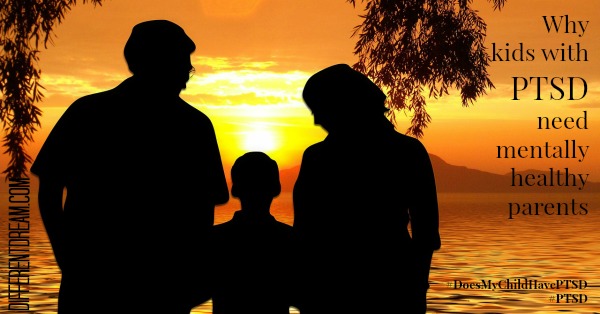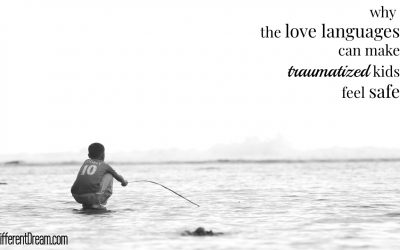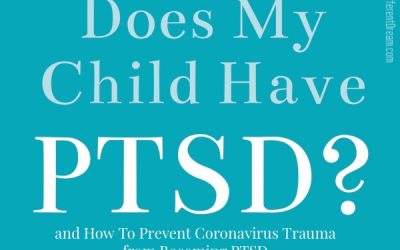Why Kids with PTSD Need Mentally Healthy Parents

Throughout June Different Dream is shining the spotlight on PTSD, short for post-traumatic stress disorder. This post continues the ongoing series about PTSD in parents of kids with special needs. Below is an excerpt from Does My Child Have PTSD? What to Do When Your Child Is Hurting from the Inside Out. The excerpt comes from the last chapter which explains why kids with PTSD need mentally healthy parents.
How to Become a Healthy and Effective Trauma Advocate
“People tend to keep quiet about trauma. Don’t give up. Keep talking. Don’t let it go. Keep it in the conversation.”
—Peggy, whose son who endured complications from early surgery and chronic, painful ear infections
Mentally Healthy Parents Have Healthier Kids
The previous chapter emphasized the positive impact a mentally healthy primary caregiver has on developing resilience in children before and after trauma. The flip side to that positive statistic is sobering. Children who are dependent upon a mentally unhealthy caregiver are less resilient and often suffer long-term complications of PTSD after a traumatic childhood event. Therefore, adults who want to nurture resilient children must first attend to their own mental health. Study after study proves this to be true.
After the 2013 missile attacks in Israel, researchers found that the children of mothers who developed PTSD after the attacks were at much higher risk of developing PTSD than other children. In a different study from 2013, mothers filled out a questionnaire about how often they abused their children, either physically or emotionally. Mothers diagnosed with both depression and PTSD were most likely to report abuse. But mothers diagnosed with only PTSD reported more abuse than those with only depression. And moms with any mental illness reported abuse more often than did mentally healthy moms. This study leaves no doubt in my mind of the importance of parents tending to their own mental health for the good of their children.
The Journal of Pediatrics published a study in 2014 about family members who had been in serious accidents together. Sometimes only the parent was injured, sometimes only the child, and sometimes both the parent and the child were injured. The study found that if parents were depressed after suffering severe injuries, their children were at risk of developing PTSD even when the kids weren’t injured. It seems that children are emotional sponges that soak up their parents’ mental health and are easily traumatized by it.
But parents can be also emotional sponges that absorb their children’s trauma, as the following two reports show. In 2005, the Children’s Hospital of Philadelphia found that parents of kids with cancer exhibited many symptoms of post-traumatic stress disorder. Similarly, Laurie Tarkan summarized the results of several studies in a New York Times online article. Her review revealed that parents of NICU infants are at a higher risk of PTSD than parents of babies never in the NICU.
Maybe Dr. Tinnin, the doctor who treated our son’s PTSD, was familiar with some of those studies when he stopped in the clinic waiting room to ask me, “What about you, Mom?” Or maybe in his years treating clients for PTSD, he’d come to understand the emotional impact parents and their children have on one another. Whatever his reason for asking the question, his words eventually spurred me to action.
Perhaps “spurred” is the wrong word. In reality, I inched my way into action after interviewing Dr. Liz Matheis and Margaret Vasquez for this book. Both of them made comments that reminded me of Dr. Tinnin’s question. Dr. Matheis said that children often change after they experience trauma, which makes parents feel helpless and anxious. When that happens, parents need time with a therapist, too. If possible, she advised, “the therapist should work with both the parent and child. Sometimes together, sometimes separate.”
Vasquez put it another way. “Where there’s trauma, there’s drama. And where there’s drama, there’s trauma. To get rid of the drama, treat the trauma,” she said. Her words made me sit up and take notice. I tended to react dramatically to events other people took in stride. Especially if the events were similar to our son’s early years. Or if they made me feel like I did the day my baby was taken away, my husband was gone making travel preparations, and I was lying alone and frightened in a hospital bed.
Was I possibly responding to unresolved trauma more than three decades later? Could I need trauma treatment, too? I couldn’t answer those questions on my own. So I once again called my big sister, the mental health counselor, and ran my questions by her.
“You went through a lot when Allen was born, and for so many years,” she said. “My guess is that some EMDR therapy would help you.” She even offered to do the research and later sent me an email with the names of several therapists in our area.
Then she gave me some final advice. “Check to see if these therapists are in your insurance network. Then call and make an appointment with one of them. If you go to the first appointment and the therapist doesn’t feel right, try a different one.”
Her advice proved to be very wise. I found a therapist who helped me work through unresolved trauma so that I am now able to step back when old memories surface and think about them rationally. Even better, I can use what I learned during my parenting years to help other families without becoming an emotional basket case in the process.
My only wish is that such treatment had been available during Allen’s early years. It would have made it easier for me to soothe and comfort him before, during, and after his surgeries and medical procedures if I hadn’t been such a bundle of nerves. Perhaps had I received treatment soon after he was born, his risk of developing PTSD would have been lower. We’ll never know what could have been different for us, because PTSD awareness and treatment was far in the future.
But for you, the future is now. If you are raising a child with PTSD or other mental issues, you are probably dealing with your own trauma, too. You need to tend to your own mental health by practicing self-care. If your child is receiving mental health treatment, ask the therapist to include you in some of the sessions or to set up a separate appointment for you. If that won’t work, ask your child’s therapist for recommendations. If all else fails, do your own research, following my sister’s advice so you can get the necessary support. You are worth the effort, and so is your child.
Excerpted from Does My Child Have PTSD?
with permission from Familius
Part 2: Special Needs Parents and PTSD–What About You Mom?
Part 5: PTSD in Parents–Moving from Negative to Positive
Part 7: PTSD in Parents of Kids with Special Needs: Visualization as a Coping Tool
Part 8: Newborns Feel Pain: The Headline that Almost Triggered My PTSD
Part 10: Why Kids with PTSD Need Mentally Healthy Parents
Part 11: PTSD and Special Needs Parents: Calling it Like It Is
By Jolene
Jolene Philo is the author of the Different Dream series for parents of kids with special needs. She speaks at parenting and special needs conferences around the country. She’s also the creator and host of the Different Dream website. Sharing Love Abundantly With Special Needs Families: The 5 Love Languages® for Parents Raising Children with Disabilities, which she co-authored with Dr. Gary Chapman, was released in August of 2019 and is available at local bookstores, their bookstore website, and at Amazon.
Subscribe for Updates from Jolene
Related Posts
When Caregiving Sparks Stress Instead of Joy, What Can You Do?
When caregiving sparks stress instead of joy, what can you do? Jolene explains practical ways to find the blessings in hard situations.
Using the 5 Love Languages to Help Traumatized Kids
Using the 5 love languages to help traumatized kids makes sense. Whatever causes the trauma, these reasons show why the love languages help.
The Coronavirus, Trauma, and PTSD
The COVID-19 pandemic is causing uneasiness in many children. This post about the coronavirus, trauma, and PTSD explains how parents can tend to their kids’ mental health.






0 Comments